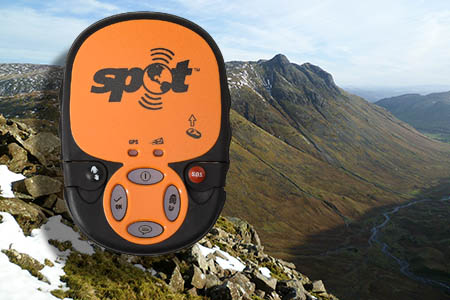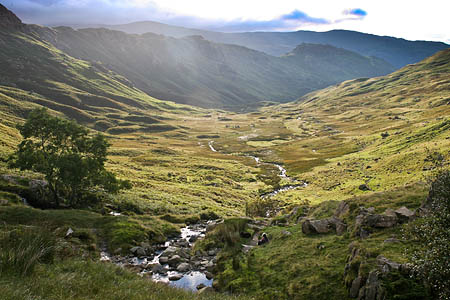Mountain rescuers in the Lake District were alerted after an emergency signal was sent from a satellite device in their area.
Langdale Ambleside Mountain Rescue Team was contacted at 3.10pm today after the SOS signal was transmitted from a Spot device in the Rossett Crag area near Angle Tarn.
The portable unit transmits an emergency signal to orbiting satellites and alerts an international monitoring centre every five minutes.
Staff at the centre contacted the Aeronautical Rescue Co-ordination Centre in Kinloss, Moray, which is responsible for all air rescues in the UK and also works with mountain rescue teams when necessary.
The Spot transceivers are carried by an increasing number of challenge teams such as Duke of Edinburgh’s Award participants as they also allow tracking by supervisors.
A Langdale Ambleside team spokesperson said: “ARCC Kinloss made initial inquiries as to the nature of the problem, but were unable to get much useful information.
“On the basis that the most likely users of this device was a group of five young people, the team was called to investigate.
“While team members were mobilising to search the area, more information was received and it was agreed that it was most likely an accidental activation.
“It was left for the group leaders to find the group and check they were OK.
“This was the first time we have been called to a Spot activation, so was a useful learning exercise, if a little frustrating that it was a false alarm.”
The incident capped a busy weekend for the Langdale Ambleside team which had four simultaneous callouts on Saturday.
A 17-year-old girl called for help after injuring her knee in Far Easedale, west of Grasmere. She was unable to continue walking, so the team turned out with help from Kendal MRT, as within five minutes they had another emergency call to Stickle Tarn.
She was treated at the scene then stretchered off the fell. The spokesperson said: “It’s a long slog up and a long slog back – and it was wet.”
The callout to Stickle Tarn was to a man suffering blurred vision and slurred speech.
While on their way to the walker, the team was told his friends had managed to get him back down to the valley and an ambulance was on its way. An air ambulance had had to turn back because of bad weather.
Within 20 minutes the Langdale Ambleside team fielded another emergency call from two young men who were lost near Bow Fell’s summit.
The team spokesperson said: “It proved very difficult to contact them, but eventually we managed a brief conversation.
“It’s not certain that they were where they thought they were, but we did our best to give them direction and get them moving in the right direction during the remaining daylight.
“We failed, and lost contact for several hours, and were just about to scale up the search, with team members returning from Grasmere, when we were told that they had found their way to Brotherilkeld.”
At the same time, three women called 999 to say they were also lost on Bow Fell.
The mountain rescue team spokesperson said: “Life is rarely so simple that all five might meet and have some form of navigational epiphany and find their own way.
“In the case of these three we managed to use our Sarloc tool, which placed them, much to their surprise, at the head of Piers Gill, some distance from where they ought to be, or thought they were.”
The top of Piers Gill is almost 4km to the North-West of Bow Fell, on the Corridor Route between Scafell Pike and Sty Head.
The spokesperson said: “We were able to tell them where they were, and making use of this information and the remaining daylight, they found their own way to Wasdale.
“Their progress was monitored by Wasdale MRT, who had been alerted once we realised where they were.
“A profitable night for west-coast taxi drivers and a poor day for navigational competence.”


